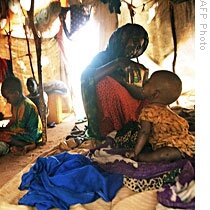 Aid groups are raising increasing alarm over a delay in international food aid towards famine-stricken Somalia. Concerns over the misdirection of aid to an Islamic militant group has threatened contributions from the United States and other Western donors.
Aid groups are raising increasing alarm over a delay in international food aid towards famine-stricken Somalia. Concerns over the misdirection of aid to an Islamic militant group has threatened contributions from the United States and other Western donors.
The World Food Program says nearly half the Somali population is in need of emergency food relief.
Ongoing lawlessness, plus a brutal drought has left much of central and southern Somalia with a severe food deficit, threatening millions of Somalis. Meanwhile, the United Nations says thousands more have been displaced by El-Niño related flash floods in the past week. The international body warns more than 280,000 additional Somalis could flee into neighboring countries if humanitarian conditions do not improve.
But the WFP said Friday the food supply line is “effectively broken”, as warehouses full of food intended for Somalia sit untouched on the Kenyan coast.
Anti-government forces, including the extremist group al-Shabab, control much of the worst-affected areas in the war-torn nation, and U.S. authorities became concerned that portions of the famine relief aid were being siphoned off by the rebel groups.
In light of U.S. anti-terrorism laws that prohibit aiding designated terrorist groups such as al-Shabab, the U.S. suspended food assistance while it reviewed its Somalia aid policy. It has since created a list of restrictions that all intermediary aid groups must follow to distribute U.S.-donated food in the region.
A researcher at The Century Foundation in New York, Natalie Parke, says the regulations have put aid groups operating in the area in a near-impossible bind. “But the problem with these conditions is that they are extremely restrictive. Basically they would preclude humanitarian organizations from operating in al-Shabab controlled areas of Somalia, and that would include about 60 percent of the most needy people in Somalia,” she said.
Speaking to VOA, a senior U.S. official denies the aid pipeline is “broken,” saying the State Department is continuously reviewing its Somali aid policy and the United States is working with local partners to get the relief programs running again.
To Parke, the dual U.S. goals of subverting extremist forces in the region and preventing a humanitarian catastrophe have produced a conflicted national policy. “Specifically my concern is that our counter-terrorism strategy undermines one of the core principles of humanitarian aid, which is impartiality. Basically that means that humanitarian aid should be distributed based on need alone, not on politics or political affiliation,” she said.
The United States is the World Food Program’s biggest donor. But other Western donors have expressed similar reservations about where foreign aid is ending up. A British official has said future donations will be contingent on the findings of an investigation into the alleged misuse of aid to the country.
Besides the U.S. regulations, the the global economic downturn is also blamed for squeezing the pockets of donor countries. A recent United Nations report estimated the WFP will need $154 million in additional funds to meet the needs of the more than three-million Somalis under risk through April.
The situation has deteriorated to the point that U.N. calculations now show that twice as many Somalis are in need of emergency assistance than was the case just one year ago. More than 1.5 million have been displaced since the beginning of 2007.
___
VOA






